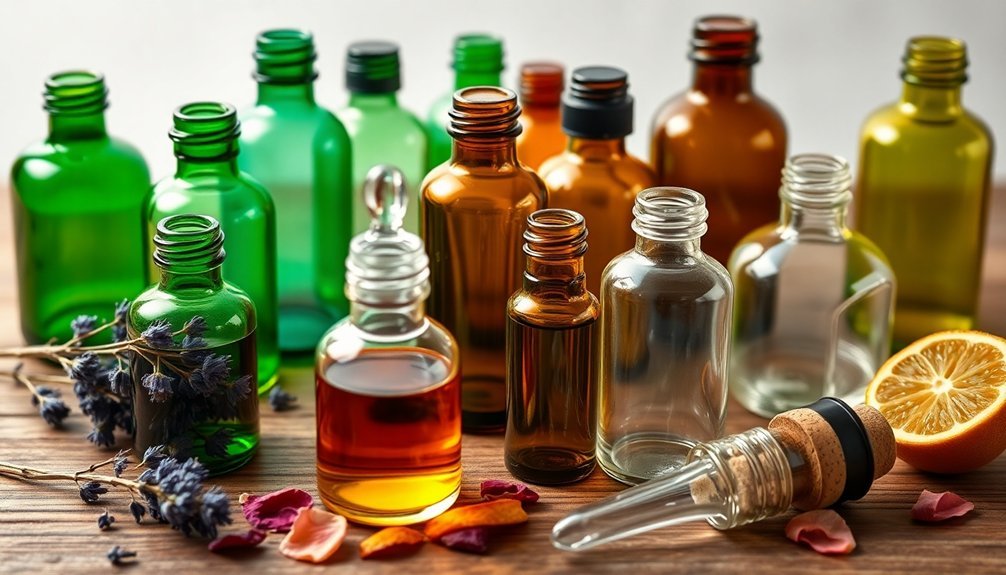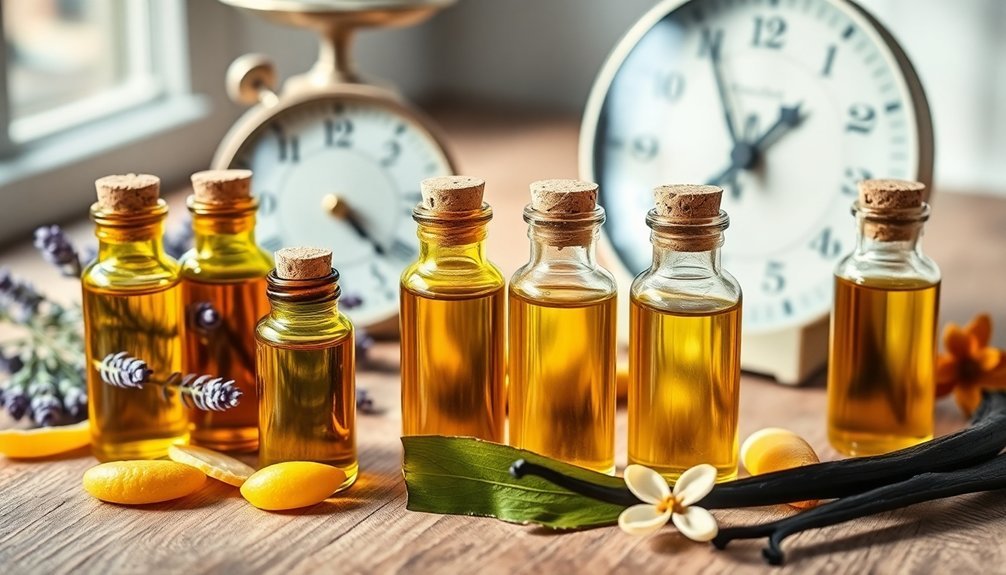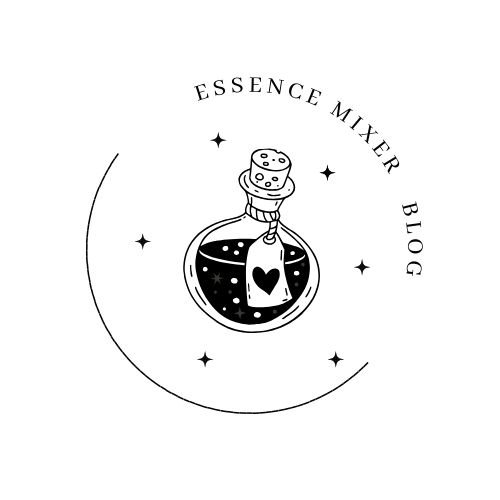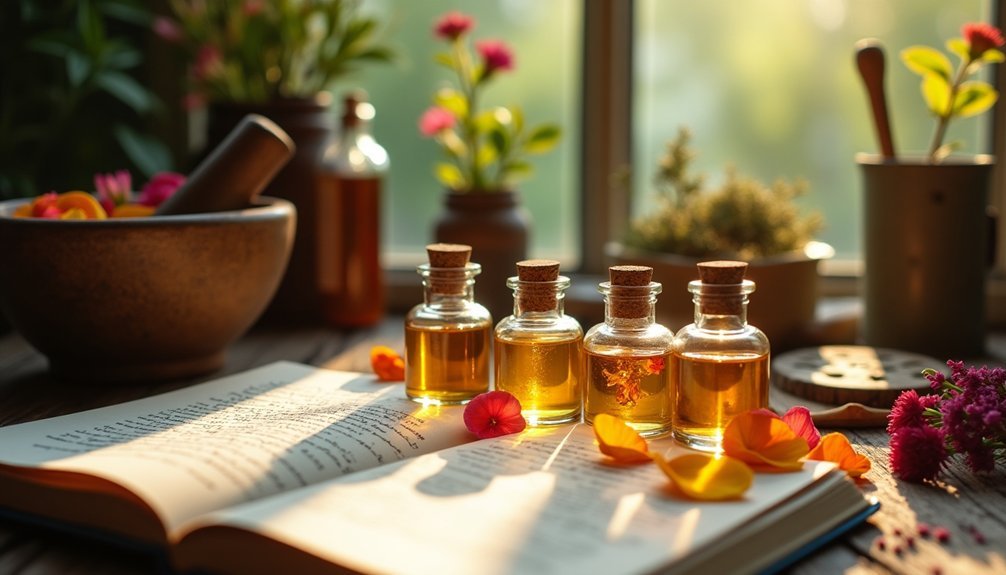You'll need five essential tools to create natural perfumes at home. Start with dark glass storage bottles to protect your ingredients, then add precision measuring tools like pipettes and scales for accurate blending. Stock up on carrier oils and base ingredients as your foundation. Quality blending equipment such as beakers and filter papers guarantees professional results. Don't forget safety supplies – proper protection lets you explore the art of perfumery with confidence.
Essential Glass Storage Bottles ($15-30)

Glass bottles serve as the cornerstone of natural perfume making, protecting your precious essential oils and custom blends from degradation.
You'll find several options, including amber and cobalt glass for UV protection, soda lime glass for its non-reactive properties, and decorative stained glass for aesthetic appeal.
When you're creating natural perfumes, you'll appreciate how glass bottles don't leach chemicals into your oils, preserving their therapeutic benefits.
They're eco-friendly, durable, and perfect for storing everything from pure essential oils to custom blends and massage oils. Small 5ml or 10ml bottles are ideal for personal perfume collections.
You can easily reuse them by cleaning with warm, soapy water or rubbing alcohol.
Remember to label your bottles with blend names, creation dates, and ingredients.
Store them in a cool, dark place to maintain the quality of your perfumes and essential oils.
Precision Measuring Tools and Pipettes ($25-45)
When crafting natural perfumes, precise measurements can mean the difference between a masterpiece and a mishap. You'll need digital scales that measure to the hundredths, along with glass beakers and graduated cylinders for accurate liquid measurements. All tools must be washed and sterilized before each use to maintain hygiene standards.
| Tool Type | Purpose | Price Range |
|---|---|---|
| Digital Scale | Weight to 0.00g | $15-20 |
| Glass Beakers | Liquid Mixing | $8-12 |
| Pipettes | Drop Control | $5-8 |
| Thermometer | Temp Control | $5-10 |
For handling small quantities of essential oils, you'll want both disposable plastic pipettes and fine measuring stem pipettes. The disposable ones are perfect for viscous oils, while stem pipettes excel at extracting from sample vials. Don't forget monprene droppers – they're superior to rubber ones since they resist solvents and prevent evaporation of your precious ingredients.
Base Ingredients and Carrier Oils ($30-50)

The foundation of any natural perfume begins with high-quality base ingredients and carrier oils.
You'll want to start with versatile carrier oils like jojoba, which mimics your skin's natural oils, or fractionated coconut oil for its lightweight feel. These carriers help dilute and deliver your essential oils safely to the skin.
For your solvent needs, consider investing in high-quality vodka or witch hazel, which blend essential oils effectively while preserving their integrity. These ingredients serve as natural alcohols that effectively disperse the scent throughout your perfume blend.
If you're creating alcohol-free perfumes, distilled water makes an excellent alternative.
When selecting essential oils, start with versatile options like lavender for its calming properties, citrus oils for fresh notes, and sandalwood for depth.
Remember to store these ingredients in dark glass bottles away from direct sunlight to maintain their potency and extend shelf life.
Perfume Blending Equipment ($40-60)
Equipping yourself with the right blending tools is vital for creating professional-quality natural perfumes.
You'll need glass beakers for mixing, pipettes for transferring liquids, and precise droppers for accurate measurements. A digital scale that measures to 0.00 grams is important for ingredient proportions.
For filtration, invest in lab-quality filter paper and funnels to guarantee your blends are pure.
Don't forget glass stirring rods for mixing and a separatory funnel for isolating essential oils.
You'll also want amber glass bottles to protect your creations from light damage, along with perfume tester strips for evaluating scents.
Complete your kit with small adhesive labels to track your blends and borosilicate measuring tools for consistent results.
These tools will give you the foundation for precise, professional perfume making.
Safety and Sterilization Supplies ($20-35)

Safety must be your top priority when crafting natural perfumes.
You'll need basic protective gear, including nitrile gloves for handling essential oils and a lab coat to shield your clothing from spills.
Don't forget safety glasses to protect your eyes from accidental splashes.
Keep a well-stocked first aid kit with an eye wash station nearby, and invest in skin protection creams to prevent irritation from ingredients like denatured alcohol.
Your workspace should include protective surface covers and proper ventilation to prevent fume inhalation.
Make sure you've got designated storage for flammable materials and a safe disposal area for hazardous waste.
While quality safety supplies can be found within the $20-35 range, don't compromise on protective equipment – it's essential for your wellbeing while creating perfumes.
Frequently Asked Questions
How Long Does Homemade Natural Perfume Typically Last Before Going Bad?
Your homemade natural perfume will typically last 1-2 years if you store it properly. You'll notice it's going bad when the scent changes or weakens, especially if you're using pure essential oils.
Can I Use Regular Drinking Alcohol Instead of Perfumery Alcohol?
You shouldn't use drinking alcohol for perfumes. It has a distinct odor and impurities that'll interfere with your fragrance. Instead, use perfumer's alcohol, which is neutral and specially formulated for fragrances.
What Temperature Should I Store My Perfume-Making Ingredients At?
You'll want to store most perfume ingredients at room temperature (65-75°F), but keep citrus oils and absolutes cooler. Natural ingredients may need refrigeration. Always protect them from heat, light, and humidity.
How Many Times Can Glass Equipment Be Reused Before Replacing?
With proper care and cleaning, you can reuse your glass equipment indefinitely. Just be certain you're inspecting it regularly for cracks or damage and maintaining proper sterilization between uses to guarantee safety.
Do Natural Perfumes Need Different Storage Conditions Than Synthetic Ones?
You'll need to be extra careful with natural perfumes as they're more sensitive to environmental changes. Store them in dark glass bottles and keep them cooler than synthetic ones to prevent faster degradation.
In Summary
You'll find that investing in these five essential tools will elevate your natural perfume-making journey from basic experimentation to skilled artistry. With proper storage bottles, accurate measuring tools, quality ingredients, professional blending equipment, and safety supplies, you're well-equipped to create unique, memorable fragrances. Don't forget that while the initial investment ranges from $130-220, these tools will serve you through countless creative formulations.





Leave a Reply